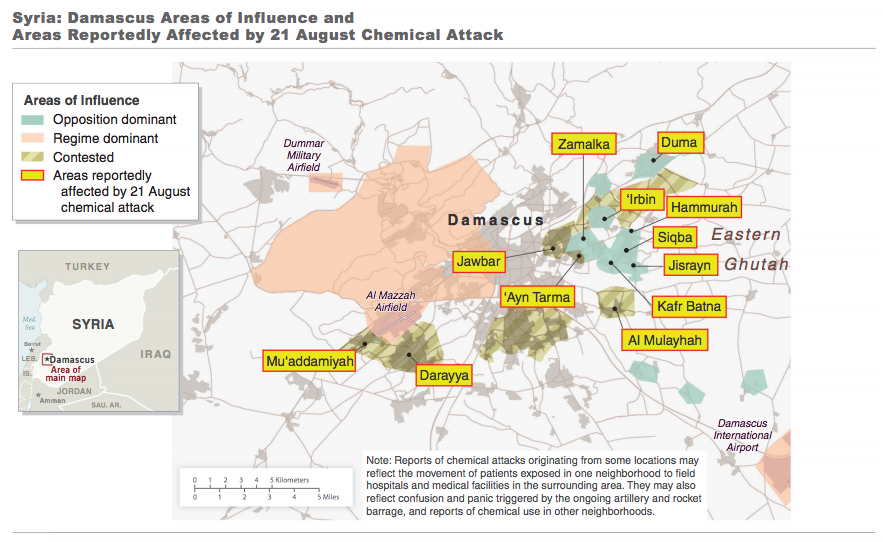The U.S. military learned the hard way that the element of surprise is a weapon that should be just as much a part of the American arsenal as Tomahawk cruise missiles.
Back in the 1990s, Saddam Hussein quickly realized that a U.S. attack on his nation was imminent whenever additional American warships and aircraft arrived in his neighborhood.
But when the U.S. decided to attack him without reinforcements, the Americans did just as much damage despite that smaller, on-hand arsenal, recalls Anthony Zinni, who ran those operations as chief of U.S. Central Command from 1997 to 2000. The element of surprise, the retired four-star Marine general noted, is a force multiplier all by itself.
Granted, the alleged use of chemical weapons by Syrian strongman Bashar Assad’s government put him on notice that a U.S. strike might be incoming for the past week. But with every passing day — now that President Obama has said he will await at least one more week for congressional action — chances are good that the Syrians are taking steps to protect whatever it is the U.S. military wants to attack.
(MORE: Congressional Debate Over Syria Will Be Test of Divided GOP)
“We can’t be waiting nine, 10 days, and allowing Syria to prepare for this,” Representative Peter King, Republican of New York who is a member of the House Intelligence Committee, said Sunday on Fox News.
Obama said Saturday — when he surprised many by saying he would seek a Capitol Hill O.K. before launching an attack — that timing was irrelevant. His top military adviser, Army General Martin Dempsey, chairman of the Joint Chiefs of Staff, “has indicated to me that our capacity to execute this mission is not time sensitive,” Obama said from the Rose Garden at the White House. “It will be effective tomorrow, or next week, or one month from now.”
But that hasn’t reassured everybody. “When the chairman the Joint Chiefs says, ‘Well, it doesn’t matter when we strike,’ well, that’s not a military action,” Senator John McCain, Republican of Arizona, said Sunday on Face the Nation on CBS. “That’s a symbolic action.”
Nonetheless, five guided-missile destroyers with some 200 cruise missiles onboard are now steaming in the eastern Mediterranean Sea. The carriers Nimitz and Truman also remain on station in the region, along with the USS San Antonio–led amphibious ready group, which is carrying some 700 Marines. But the President is unlikely to risk U.S. pilots flying air strikes over Syria and has already declared there will be no U.S. combat boots on Syrian soil. That suggests an all-Tomahawk strike.
Tomahawks work best against undefended, fixed targets. That makes them ideal for military headquarters, barracks and depots that lack heavy protection like Syria’s chemical-weapons bunkers. Plus, once blown up, such buildings won’t spread deadly agents like a strike on a chemical-weapons stockpile could.
Syria could try to deter such strikes by forcing civilians into such buildings — if it felt a strike were imminent — and announcing they’d done so to the world. Any commander who has been willing to use chemical weapons against his own people, Pentagon officials believe, wouldn’t hesitate to use them to protect cherished military assets. Or Assad could protect mobile military assets such as rockets and artillery tubes by moving them into densely populated areas.
Syria has already used civilians as “human shields,” according to a report last year. “Witnesses … told Human Rights Watch that they saw the army and pro-government armed men, referred to locally as shabeeha, force people to march in front of the advancing army during the March 2012 offensive to retake control of areas that had fallen into the hands of the opposition,” said a report by the independent group. “From the circumstances of these incidents, it was clear to the witnesses that the purpose of this was to protect the army from attack.”
Of course, two can play such targeting games. One former four-star general, speaking privately, suggests that there is still a way for the U.S. to preserve the element of surprise. “Our first strike could simply attack and destroy his air-defense network,” says the retired officer, well versed in targeting intelligence. “Then, once he’s blinded, we can say, Go ahead — use chemical weapons again and see what happens next time.”


